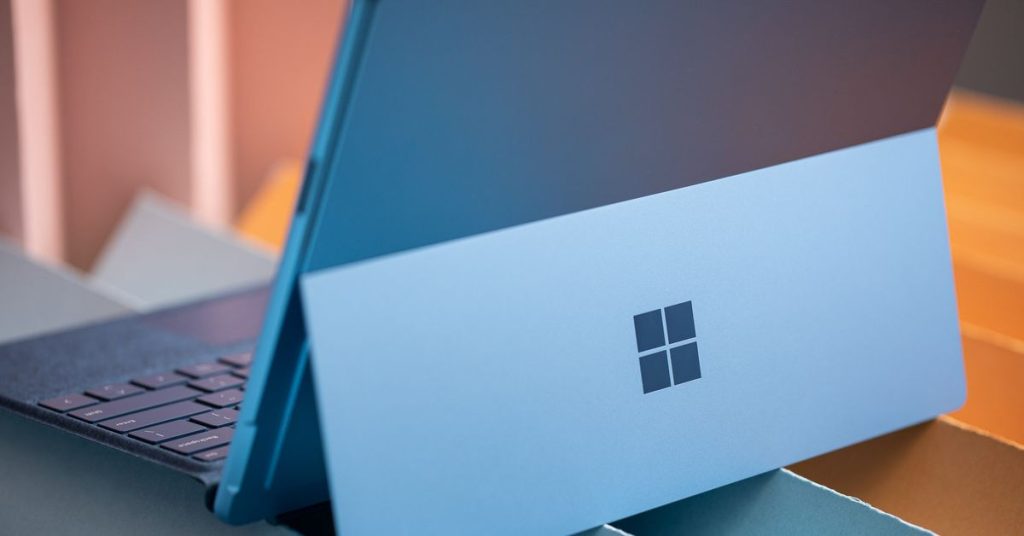
Panos Panay has always been the force behind Microsoft’s Surface line. He helped bring Surface to life as a secret project more than 10 years ago. He’s presented the new devices onstage at events, showed up at malls to promote Surface hardware, and has steered Microsoft’s Surface tablets to success in the years since.
Now, he’s leaving in a surprise departure announced just days before Microsoft’s next big Surface event. Panay will no longer be presenting at Microsoft’s showcase on Thursday but will remain at the company for another couple of weeks as part of a transition process. He’s reportedly joining Amazon to replace Dave Limp and lead Amazon’s Echo and Alexa push. Amazon is also holding its own hardware event on Wednesday.
Panay has spent the past decade largely focused on Surface devices after Microsoft first developed its tablet as a Windows-powered rival to Apple’s iPad. The Surface Pro tablet, which started off as a string and plastic concept, has had a lasting influence on Windows laptops, pushing Microsoft’s OEM partners and rivals to focus on quality and 2-in-1 devices. The line’s success brought Panay into the role of Microsoft’s chief product officer.
With Panay’s shock resignation, Microsoft’s event in New York City will now offer the first glimpse at the future of Windows and Surface under new leadership. Microsoft is expected to unveil three new Surface devices but also focus on AI-powered features for Surface, Windows, Office, Bing, and more.
Yusuf Mehdi, Microsoft’s consumer marketing head, will now take on the responsibility of leading the Windows and Surface businesses and products externally. Crucially, Mehdi’s job title hasn’t changed with Panay’s departure here, so Microsoft no longer has a chief product officer.
With no clear replacement for Panay’s unique role at Microsoft, it seems like Mehdi will take on his responsibilities of being the main face of Windows and Surface devices. Whereas Panay is a product maker, Mehdi has, more often than not, been the marketing guy for Microsoft’s various consumer efforts.
He first joined Microsoft in 1992, working on product management for Internet Explorer and Windows before helping lead Microsoft’s entry into search with Bing. His career at Microsoft has spanned three different CEOs — Bill Gates, Steve Ballmer, and Satya Nadella — and a variety of different product launches. He’s been involved in Surface, the Windows 10 launch, and the HoloLens headset.
Mehdi was also at the center of Microsoft’s failed TV push for Xbox and the launch of the Xbox One console. Later, he was in charge of a “modern life” initiative to try and win back the consumers Microsoft had let down, following the company’s decisions to kill off its Groove Music service, discontinue Kinect, scrap its Microsoft Band fitness device, and even discontinue Windows Phone. Microsoft eventually laid off its modern life team during cuts last year.
Microsoft is splitting up some of Panay’s other responsibilities. Pavan Davuluri, who heads a team focused on silicon, systems, and devices across Windows and cloud, will now report directly to Rajesh Jha, Microsoft’s vice president of experience and devices. This team includes key Surface talent like Ralf Groene, Stevie Bathiche, and Robin Seiler. Pavan will also take on Windows planning and release management responsibility.
Interestingly, Microsoft is also building a new “Windows and Web Experiences” team. Microsoft often forms these types of teams when it wants to tackle a particular new area for Windows, and this time, it’s building AI-powered web services for Windows. We’ve already seen Microsoft pivot towards web-powered features in Windows 11, with basic things like the search interface dynamically updating from the web, a widgets system, and more. So expect to see a lot more of this in the future.
Mikhail Parakhin, who has been focused on Bing Chat in recent months, is leading this new experiences team, and it will include executives who have a history in product management, engineering, and Microsoft’s cross-devices Android work.
These Windows and Surface leaders will now steer Microsoft’s operating system and hardware toward AI. It’s what Microsoft wants people to get excited about right now and something we’re likely to see a lot of at the company’s event on Thursday. Microsoft has been increasingly trying to use Windows as a vehicle for its AI efforts or to try and push Bing and Edge onto consumers and businesses alike.
I interviewed key Surface members last year for a story on 10 years of Surface, and it was clear from speaking to them that AI was going to have a big impact on Windows and Surface for the next decade to come. There have been persistent rumors about the company building its own Arm chips for servers and Surface PCs, and even rival AI chips to avoid a costly reliance on Nvidia.
“AI is going to reinvent how you do everything on Windows,” Panay said earlier this year. Panay won’t be at Microsoft anymore to lead this reinvention of how you use Windows. But his resignation hasn’t signaled a strategy shift or change in direction for Windows at Microsoft, from what I can tell.
The question right now is around how Microsoft continues to innovate on the hardware side. Panay was always a devices fan, having led the Surface Pro development that has seen companies like Apple, Dell, and Asus produce their own Surface-like devices. But Microsoft signaled changes in its hardware portfolio earlier this year amid layoffs. Is there still room for Surface to do innovative laptop and tablet designs like we’ve seen over the last decade, or does Microsoft’s push for AI overshadow the risky hardware bets?
Microsoft is rumored to have scrapped plans for a dual-screen Surface Duo 3, years after effectively canceling its Windows-powered Surface Neo dual-screen device. It’s not clear what the future holds for Microsoft’s own Android efforts. The original Surface Duo just reached end of life with just two Android version updates. Microsoft’s mice, keyboards, and webcams have also been discontinued in favor of Surface accessories.
Microsoft also invested heavily in Windows 11 during the pandemic and the PC sales boom, but Surface and devices revenue has been battered this year as PC shipments experienced big declines. Before the PC pandemic boom, Nadella was also looking at a future beyond Windows, iOS, and Android. He joked in January 2020 that Windows could be called “Azure Edge” in the future to make it clear that cloud services are the biggest hardware business at Microsoft.
During the FTC v. Microsoft hearing, we heard that Microsoft wants to move Windows fully to the cloud on the consumer side, something it has been increasingly doing on the commercial side with Windows 365. The formation of a new web-focused Windows team suggests this effort is very much in motion.
Perhaps this uncertainty around the PC business after a big boom in sales has led Panay back to just wanting to build devices rather than the complicated task of running Windows and gearing it up for AI and a future in the cloud.
All of this will be top of mind watching how Microsoft discusses Windows and Surface at its event on Thursday. We’re entering a new AI era for Windows and Microsoft’s many services, and it will be key to see exactly how Surface plays its part without one of its key inventors at the helm.

 Latest Breaking News Online News Portal
Latest Breaking News Online News Portal




